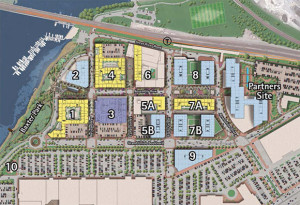By Josie Grove

The Somerville Board of Aldermen is putting forward measures that would require 68% of development in the city to be zoned for commercial use.
Amid all the development in Somerville and the large-scale neighborhood planning projects, the Board of Aldermen has decided to take a stand. Last Thursday, the board took up discussion of a rule that would require all large developments in specific development districts neighborhoods to be 68% commercial. While the number is dramatic, “It really doesn’t affect much of the city,” said Alderman-at-Large William White, who proposed the rule.
The other members of the board, excluding Ward Four Alderman Tony LaFuente, who was not present, signed on to the proposal. The aldermen emphasized that commercial property generates much more revenue for the city, and all said that more non-residential development could help rein in property taxes, particularly as major expenditures loom on Somerville’s horizon.
“Looking forward, we can see that we have tremendous capital demands. And unless these capital demands are met by more commercial development coming to this city, the burden that is going to be placed on the average taxpayer is going to be quite substantial,” White said, referencing the new high school, two library renovations, and sewer system upgrades.
The city’s Office of Strategic Planning and Community Development has dealt with the commercial-residential balance in their plans for the city. Alderman White’s proposal aligns closely with OSPCD’s goals.
“While we did not work directly with the alderman as he developed this particular proposal, the general idea of a 60% commercial development minimum in areas such as Boynton Yards and Innerbelt is embedded in the SomerVision plan that we’ve been working to implement over the past four years,” George Proakis, the Director of Planning, said in a statement. Limits on residential development in certain areas were outlined in SomerVision, the OSPCD’s comprehensive plan, and codified in “special district” provisions in last year’s zoning overhaul.
“There are substantial similarities between the two strategies, although the proposal by the Alderman has a few differences,” said Proakis. White’s proposal for commercial development excludes retail, hotel, industrial, arts, and fabrication. Proakis also noted that the proposal targets slightly different areas, including some and excluding others that were part of the OSPCD’s plan.
White’s plan has taken square footage to be the unit of comparison, while the OSPCD has lately questioned the usefulness of that measurement in comparing residential to commercial development. At a meeting in early February about plans for development in Union Square, OSPCD staff discussed the difficulty in defining a commercial-residential balance by square footage, and whether there might be a more nuanced comparison, such as jobs per unit of housing. White maintains that the square footage is the most important consideration for him.
The aldermen present at last Thursday’s meeting supported the proposal, and were clearly pleased that the action had come from the Board of Aldermen. “I appreciate OPSCD and their opinions and everything, but we have made this decision for very concrete reasons,” said Ward Two Alderman Maryann Heuston. “Ultimately, the zoning in the city does belong to us. We have the last say in it. And we need to be able to leverage that power for outcomes that are important in the city.”
“I think it is an important statement by this board, and also an proper exercise of the power that the city charter grants us, said White. “We are really the power broker when it comes to zoning, but oftentimes we sit back and let the planning staff provide reports and recommendations et cetera to us.”
The proposal will go before the planning board for a joint public hearing, at which point there will be opportunity for the public to give their input. The OSPCD’s planning department will also give their opinion. “We are reviewing this proposal, which is a complicated proposal that is likely to have a number of policy implications as it relates to development review in the transformative areas of the city,” said Proakis. “As with all amendment proposals, the Planning Division will review it thoroughly and provide recommendations when a hearing is scheduled. I look forward to the opportunity to discuss this proposed amendment in detail with the Board of Aldermen and the Planning Board.”
“This is just the start of the process,” said White.















Somerville had a good thing going when it had a good mix of commercial and residential. We should have been back on track with this some 30 years or more. It has been obvious to many taxpayers that commercial development was not being pursued and was much needed here.